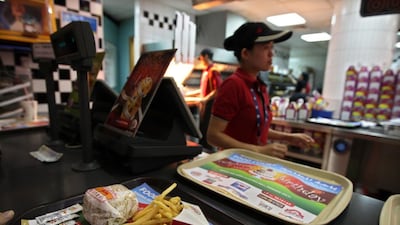My first memory of the UAE is the taste of deep-fried chicken. KFC, to be precise.
It was late at night when we stepped off the plane 20 years ago – my mother, brother, sister and I – to be greeted by my father.
Later still, my dad, who knew we were not allowed to eat KFC back home in Glasgow because it was not halal, drove us to one of the restaurant chain’s outlets, where he picked us up a bucket-sized family meal. Though my love affair with fast-food was not to last, KFC, and other fast-food chains, were to play an important role in the time I spent in the UAE as a teenager.
Back in the mid to late ‘90s in Abu Dhabi there was not much in the way of activities for teens to lose themselves in.
There was, however, Burger King, which was one of the few places we could go to socialise.
Tucked away on Zayed the First Street, you could easily walk by the small BK franchise. But these days, somewhat forgotten, it is no longer the focal point for the city’s youth.
“Absolutely. Burger King was the place to hang out,” says Louise, who grew up in the capital.
“And it wasn’t just the [International School of] Choueifat kids who hung out there, it was the kids from all schools – American Community School, French School, Abu Dhabi International School, et cetera.
“To be honest, that was really the only ‘cool’ choice we had. I mean, there were no malls or anything like that, only the Hamdan Centre – and that wasn’t cool enough.”
It might be odd to think of a fast-food joint as being integral to one’s childhood, but that’s what it was.
Rabie, who spent three to four years of his teens hanging out at the Khalidiya Burger King, recalls a different age, when simpler things attracted people in their droves, such as a self-service soft drink dispenser.
“You would order a meal or a drink and you would always get refills,” says the Palestinian.
“It was something new to have the self-service machine. And we would go, we would gather and meet our friends, or chat with people we had met at Tourist Club, or who were from different schools,” says Rabie, who used to spend two to three hours there.
The lure of socialising and eating aside, the restaurant served another purpose too, for some of those who gathered there.
“When they wanted to fight someone, it would be 8pm outside Burger King,” says Louise.
However, any threats of fisticuffs usually ended on a happier note, says Rabie, who left the capital in the late ‘90s.
“The funny part was, you said, ‘You want to have a fight? Let’s go to Burger King. Because my friends will be there; his friends will be there’.”
In a city where, decades ago, it was not out of place for everyone to know your name, there was little chance of any threats turning physical.
And on many occasion, when the two groups would come head to head, friends on either side would spot each other, leading to the would-be fighters calling it a day.
Burger King, and a few other chain restaurants that did not survive the city’s growth, offered a greasy sanctuary for the city’s teens.
“Back then, we barely had any places to hang out. It was either a club or just fast-food joints,” says former resident Chadi.
“Not sure why, but that’s where everybody decided to meet. We always found each other without the need of cell phones and always planned whatever happened next from there.”
When Chadi was growing up in the capital, Burger King and McDonald’s were starting to become popular, he says.
Other places to be seen were the now long-gone Arby’s by Eldorado cinema, on Hamdan Street, and the Dairy Queen on the Corniche.
Though the food may not have been memorable, the company was, says Chadi.
“What remains of those places in my mind is the good friends I hung out with.
“We had a meal here and there, hung out, and told stories and that was that.”
Looking further back, it was the Hardee’s in the Tourist Club area that was a favourite of many.
“They used to give away Thunder Cats VHS tapes with every two kids’ meals. We still have those tapes,” another long-term resident recalls.
Passing time at the Tourist Club or Hamdan Centre, going to Eldorado Cinema or hanging out by Spinneys in Khalidiya, no matter where the city’s teenagers started their night, most paths would eventually lead them to one place – Burger King. It was, says Rabie, not only a more social and interactive way of life, but more naïve too.
“If I look at teenagers the same age [now], yeah, we were so innocent.”
Zaineb Al Hassani is a senior news editor at The National.

